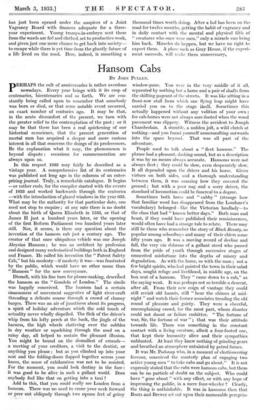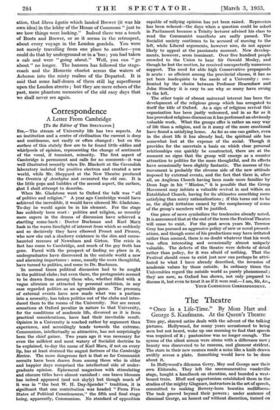Hansom Cabs
BY JOHN POLLEN.
PERHAPS the cult of anniversaries is rather overdone nowadays. Every year brings with it its crop of centenaries, bicentenaries and so forth. We are con- stantly being called upon to remember that somebody was born or died, or that some notable event occurred, an exact number of centuries ago. It may be that, in the acute discomfort of the present, we turn with -the greater relief to the contemplation of the past ; or it may be that there has been a real quickening of our historical conscience, that the present generation of mortal men has acquired a deeper and more curious interest in all that concerns the doings of its predecessors. Be the explanation what it may, the phenomenon is beyond dispute : occasions for commemoration arc always upon us.
In this respect .1933 may fairly be described as a vintage year. A comprehensive list of its centenaries was published not long ago in the columns of an enter- prising journal. Truly, a remarkable catalogue. It begins —or rather ends, for the compiler started with the events of 1833 and worked backwards through the centuries —with the introduction of glazed windows in the year 633. What may be the authority for that particular date, one need not stop to enquire ; at any rate there is no doubt about the birth of Queen Elizabeth in 1533, or that of James H just a hundred years later, or the opening of the first Reform Parliament two hundred years later still. Nor, it seems, is there any question about the invention of the hansom cab just a century ago. The creator of that once ubiquitous vehicle was one Joseph Aloysins Hansom ; he was an architect by profession and designed many ecclesiastical buildings both in England and France. He called his invention the " Patent Safety Cab," but his modesty—if modesty it was—was frustrated by the public, which would have no other name than " Hansom " for the new conveyance. Disraeli, with his fine turn for phrase-Making, described the Transom as the " Gondola of London." The simile was happily conceived. The hanSom had a certain sinuousness of movement suggestive of light river-craft threading a delicate course through a crowd of clumsy barges. There was an air of jauntiness about its progress, a spirit of liolidaY adventure which the cold touch of actuality never wholly dispelled. The flick of the driver's whip from his lofty perch at the back, the jingle of the harness, the high wheels clattering over the cobbles in dry weather or squelching through the mud on a rainy day, all helped to sustain the pleasant illusion. You might be bound on the dismallest of errands— a meeting of your creditors, a visit to the dentist, or anything you please ; but as you climbed up into your seat and the folding-doors flapped together across your knees, the sense of exhilaration was not to be resisted. For the moment, you could look destiny in the face : it was good to be alive in such a gallant world. - Does anybody feel like that on getting into a taxi ?
Add to this, that you could really see London from a hansom. There was no need to crane your neck forward or peer out obliquely through two square feet of griiny
window-pane. You were in the very middle of it all, separated by nothing but a horse and a pair of shafts from the shifting pageant of the streets. It was like sitting in a front-row stall from which one flying leap might have carried you on to the stage itself. Sometimes this actually happened without any volition of your own ; for cab-horses were not always sure-footed when the wood pavement was slippery. Witness the accident to Joseph Chamberlain. A stumble, a sudden jolt, a wild clutch at nothing—and you found yourself somersaulting outwards into the space beyond. That was all part of the adventure.
People used to talk about a " fleet hansom." The phrase had a pleasant, dashing sound, but as a description it was by no means always accurate. Hansoms were not always fleet ; they could be slow, even desperately slow. It all depended upon the driver and his horse. Given virtues on both sides, and a thorough understanding between them, it was amazing how they covered the ground ; but with a poor nag and a sorry driver, the standard of locomotion could be funereal to a degree.
Sometimes both horse and " cabby " (strange how that familiar word has disappeared from the Londoner's vocabulary) belonged—like the Victorian landlady—to the class that had " known better days." Both man and beast, if they could have published their reminiscences, would often have had a strange tale to relate. There may still be those who remember the story of Black Beauty, so popular among schoolboys and many of their elders some fifty years ago. It was a moving record of decline and fall, the very via dolorosa of a gallant steed who passed from the pride of youth through successive stages of unmerited misfortune into the depths of misery and degradation. As with the horse, so with the man ; not a few bright spirits, who had painted the town in their salad days, sought refuge and livelihood, in middle age, on the box seat of a hansom. They " came down to a cab," as the saying went. It was perhaps not so terrible a descent, after all. From their new coign of vantage they could still revisit old haunts, still " hear the chimes at mid- night " and watch their former associates treading the old round of pleasure and gaiety. They were a cheerful, uncomplaining crowd, for the most part, whom disaster could not daunt or failure embitter. " The fortune of war, Sir, the fortune of war " ; that was their attitude towards life. There was something in the constant contact with a living creature, albeit a four-footed one, that kept their humanity alive and their sympathies unblunted. At least they knew nothing of grinding gears and breathed an atmosphere untainted by petrol fumes.
It was Mr. Podsnap who, in a moment of electioneering fervour, conceived the masterly plan of engaging two active young men " to take cabs and go about." It is not expressly stated that the cabs were hansom cabs, but there can be no particle of doubt on the subject. Who could have " ;pine about " with any effeet, or with any hope of impressing the public, in a mere four-wheeler ? Clearly, the thing is unthinkable„ It was in hansoms then that Boots and Brewer set out upon their memorable peregrin-
ation, that libera legatio which landed Brewer (it was his own idea) in the lobby of the House of Commons " just to see how things were looking." Indeed there was a touch of Boots and Brewer, or so it seems in the retrospect, about every voyage in the London gondola. You were
• not merely travelling from one place to another—you could do that by underground or in a 'bus ; you had taken a cab and were " going about." Well, you can " go about " no longer. The hansom has followed the stage- coach and the Homeric chariot across the waters of Acheron into the misty realms of the Departed. It is said that some half-dozen of them still lag superfluous upon the London streets ; but they are mere echoes of the past, mere phantom memories of the old easy days that we shall never see again.



















































 Previous page
Previous page